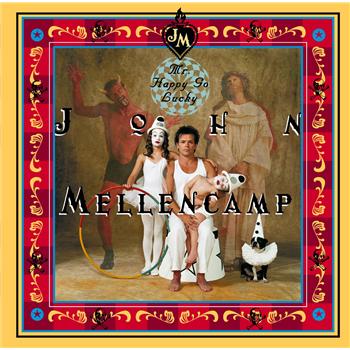
Mr. Happy Go Lucky (1996)

1. Overture
2. Jerry
3. Key West Intermezzo (I Saw You First)
4. Just Another Day
5. This May Not Be the End of the World
6. Emotional Love
7. Mr. Bellows
8. The Full Ctastrophe
9. Circling Around the Moon
10.Large World Turning
11.Jackamo Road
12.Life is Hard
Every artist with a long career reaches a moment where reinvention becomes not just possible, but necessary. For John Mellencamp, Mr. Happy Go Lucky—released in 1996 following a mild heart attack—was that moment. What makes this record so surprising isn’t just how different it sounds from what came before, but how natural that shift ends up feeling.
From the opening bars, it’s clear this is no longer the rootsy, barn-burning Mellencamp of Scarecrow or The Lonesome Jubilee. Instead, we get a slicker, funkier, and—dare it be said—danceable version of Mellencamp. Yes, the grooves lean toward programmed loops and layered textures, but this isn’t some midlife crisis album wrapped in trend-chasing production. It’s more curious than desperate, more exploratory than evasive.
Much of the credit goes to Mellencamp’s decision to embrace modern studio tools without abandoning his identity. There are loops, spoken word snippets, and even the occasional beatbox-like rhythm—but instead of young hip-hop producers or industry fixers, Mellencamp fills the edges with the kind of small-town voices and stories that have always shaped his music. The production is clean but not sterile, slick but not soulless.
Key West Intermezzo (I Saw You First), the album’s standout and lone hit, is a perfect encapsulation of what Mr. Happy Go Lucky gets right. It’s smart, catchy, and pulsing with energy, yet unmistakably Mellencamp at its core. It deserved to be a bigger success. Just Another Day and The Full Catastrophe also shine, both managing to fuse experimentation with solid songwriting in a way that never feels forced.
Lyrically, Mellencamp doesn’t wander far from familiar ground. There’s plenty of disillusionment, soul-searching, and quiet rage beneath the surface—but for once, the heavy themes aren’t front and center. The words are sometimes buried under the mix, allowing the instrumentation to take more of the spotlight. That subtle shift in dynamic helps the album feel less like a lecture and more like a late-night conversation.
Mr. Happy Go Lucky isn’t just a stylistic detour—it’s a creative rejuvenation. In many ways, it plays like Mellencamp’s own Sgt. Pepper—a self-contained moment of bold experimentation that works because the artist behind it knows exactly who he is. He doesn’t chase the sound—he bends it to his will.
This isn’t the album fans expected. But that’s precisely why it works as well as it does.
Go back to the main page
Go To Next Review